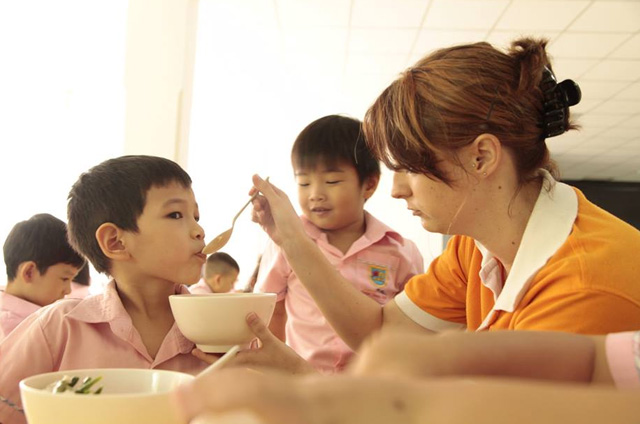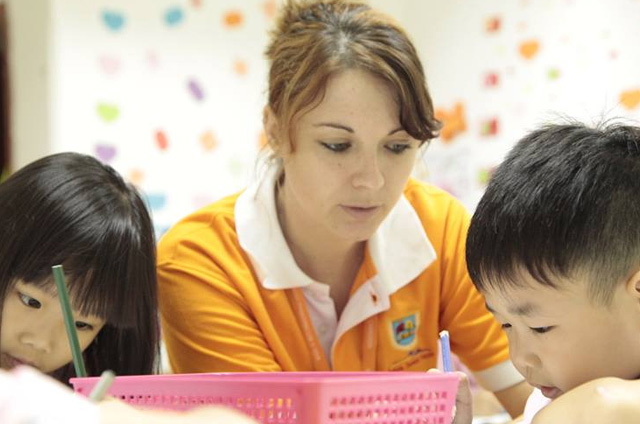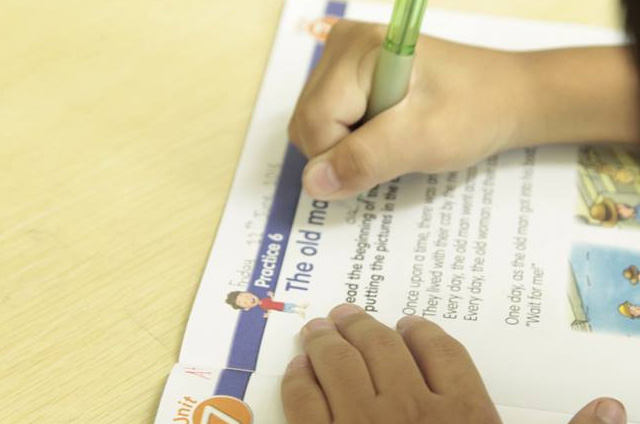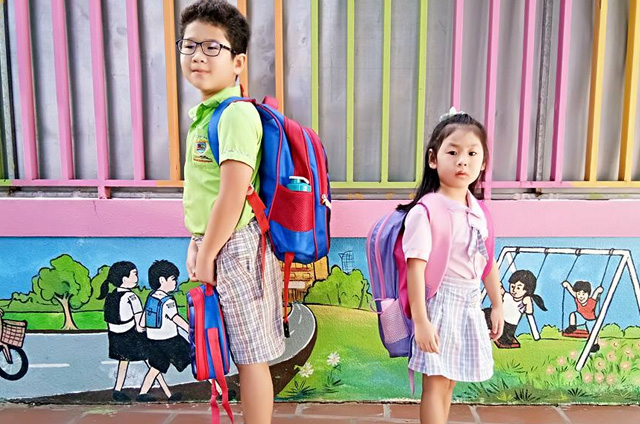World international School Cambodia (WISC) aims to make learning relevant and meaningful to students by adopting an inquiry-based, integrated curriculum which focuses on the child as a learner. WISC recognises that children come to us as distinct individuals with unique experiences, backgrounds, abilities and interests. Teachers at WISC promote cross-cultural understanding, and differentiate instruction to meet students’ varying needs, abilities and learning styles. We provide a balanced education program within a safe, stimulating environment so that each child can learn and grow to their greatest potential. No child is left behind.
Our Primary School curriculum also includes instruction in Chinese and Khmer Languages, Social Studies, Science, Art, Music, Dance, Physical Education and Library Skills with a focus on information technology. Classes follow Units of Inquiry which guide their studies over
ENGLISH
English is the language of instruction at WISC. Our Language Arts programme is central to the learning and development of all our students. Ourgoal as an international school is create effective communicators and critical thinkers who are able to analyse, understand and build relationships with the world around them.
At WISC our approach in teaching languages is based on the premises that oral communication is the foundation of literacy and encompasses all aspects of speaking and listening skills.
We make sure that as teachers deliver the contents of the curriculum, lessons are developed and taught ways that provide many opportunities for students to interact with others, listen to and use language, expand vocabulary and become effective communicators.
We believe in the importance of ensuring that students engage in ‘purposeful talk’ as a tool for learning so that they can clarify and articulate their thoughts or ideas. Thinking aloud enables learners to construct and reconstruct meaning, to better understand the world around them.
Discussion and oral presentations are core aspects of lessons as students gather information, rehearse their thinking, and express knowledge or points of view. Our students learn how to listen attentively, to understand and evaluate what they hear, to think about literal and inferred meaning and to respond appropriately.
The primary purpose of our reading curriculum at WISC is for students to develop an appetite for reading and a love of literature. The world of books is opened up to our students with many opportunities to engage with texts on their own or with others.
We teach our children reading behaviours to develop personal stamina, choice and independence. We want our students to be joyful, voracious and independent readers who possess a deep appreciation and understanding of literature.
At WISC we have a tradition of ensuring that our beginning readers are supported in their reading instruction through daily phonics work and a rigorous levelled reading programme which supports their accuracy and comprehension skills until they are independent readers.
The WISC reading programme then transitions to place emphasis on developing increasingly complex comprehension strategies and opportunities for the interpretation of themes, perspectives and purpose of a variety of text types.
At WISC we believe that writing is a powerful means by which we remember, develop, organise and communicate ideas, feelings and information. Through our writing curriculum we hope to inspire writers who compose with passion and ease. We want our students to be motivated, confident writers who see writing as an everyday, useful and enjoyable experience.
Through our daily classroom writing activities, students are encouraged to express themselves creatively, imaginatively and effectively in a range of genres. As a result, students at WISC become enthusiastic and critical readers of quality mentor texts, so as to have exposure to effective models of the written form and the opportunity to study how authors write.
Teachers at WISC are dedicated to developing writers through our daily writing experiences and ensuring that children are engaged in purposeful opportunities with authentic purposes and audiences.
SINGAPORE MATHS
Students at World International School Cambodia (WISC) are taught that the language of Mathematics is used to describe, analyse and make sense of the world around us. Our students also learn that, Mathematics involves developing the understanding of relationships between things, the making of representational models, the interpretation of data, and the development of numeracy.
Through these applications, our students develop the core skills of problem-solving and logical reasoning. These skills are key drivers to living and working in this innovative and technological age.
At WISC, we have adopted the Singapore Mathematics curriculum as we believe it is a rigorous approach to teaching Primary School Mathematics. This is because the Singapore methodologies places great emphasis on the development of problem solving skills using the model approach, leading to an understanding of algebraic reasoning.
This approach embraces Jerome Bruner’s stages of enactive (concrete), iconic (pictorial) and symbolic (abstract) learning.
The Mathematical thinking which is embedded in the Singapore Maths approach, involves questioning, constructing a rational and logical system of investigation and problem-solving. These skills are vital to our future-orientation students who are living in an age of innovation, invention and scientific discovery.
The unique feature of the Singapore Maths curriculum is the spiral design, where a concept such as fraction, begins life on a very tight and small circle of the spiral. At the next level, the spiral opens up to revisit a prior concept taught and to introduce other related but more difficult concepts.
This continues to Grade 6 until all the related ideas are developed. Hence the children are provided with opportunities to revisit concepts introduced in an earlier year and to extend them.As a result of this approach, our primary school programme enables students to develop their ability to:
- Understand the following mathematical concepts:
- Numerical
- Geometrical
- Statistical
- Algebraic
- Recognise patterns and spatial relationships
- Know common systems of units
- Use mathematical language, symbols and diagrams to represent and communicate mathematical ideas
- Perform operations with whole numbers, fractions and decimals
- Perform simple algebraic manipulation
- Develop the ability to perform mental calculation
- Present and interpret information in written, graphical, diagrammatic and tabular forms
- Use learned concepts and appropriate heuristics to solve problems
- Think logically and derive conclusions deductively
- Develop Inquiry skills through investigative activities
CHINESE
Curriculum Overview
- Communicate in oral and written form within a variety of contexts in daily life
- Develop skills in listening, speaking, reading and writing through a holistic approach to language learning
- Appreciate Chinese culture through the Arts, customs, celebrations and traditions
Learning Chinese is an integral part of the experience at WISC and we hope our children will develop a deep interest in learning and using the language. So whether this is the student’s first exposure to Mandarin, or if it is their first language, our stream approach caters for a wide range of learners with a variety of linguistic and cultural backgrounds. We offer Chinese as an additional language, rather than on a bilingual platform. Our Mandarin language and Chinese culture lessons take place daily for all classes, with further immersion opportunities for the language slow learners.
At WISC, our Chinese lessons are led by a team of dedicated native Chinese professionals, and the relative activities are characterised by high levels of active engagement, enthusiasm and energy. Using a range of interactive methods, students participate in singing action songs and rhymes, role play, online learning and collaborative activities.
The experience we provide and the curriculum that has been designed, provide the systematic development of skills and knowledge of the Chinese language.
Upon leaving the Primary School Chinese programme, our children will be confident users of the language and are capable of dealing with the challenges posed to them as continue with their Chinese language instruction at the secondary school level.
Digital Literacy
World International School Cambodia (WISC) uses digital literacy, to help provide for, guide and support our students with purposeful experiences that will help them:
- Develop problem solving and higher order thinking skills through learning the basics of Information Communication Technology (ICT)
- Communicate and collaborate effectively and meaningfully using a variety of digital tools and technologies
- Create, personalise, interact with and present their own content using industry standard tools and best design practices
- Build understanding about how to use technology appropriately and meaningfully
- Take ownership of their learning, and be able to evaluate it and reflect upon it
- Become a responsible Digital Citizen, by developing an understanding of how to be safe online, make responsible decisions about sharing information, and evaluate and acknowledge sources of information
In view of the captioned objective, it is clear that Digital Literacy at WISC is used to enhance the teaching-learning environment as it pervades all subject areas and phases of learning. We are dedicated to ensuring that our students have access to instructional, assistive and innovative technology to support their learning experiences, and within a learning environment that extends beyond the four walls of the classroom.
We remain steadfast to our commitment that online learning happens in developmentally appropriate and authentic ways.
Students use technology tools to locate, explore, analyse, exchange and present information responsibly and creatively. We believe that increased competence in the use of Technology promotes initiative and independent learning, with students being able to make informed judgments about when and where to use it to best effect.
Our Digital Literacy teachers work alongside subject teachers in weekly lessons to seamlessly integrate ICT into the units of study in all classes. This integrated model ensures that the children have personalised and authentic learning experiences across a range of curriculum areas. Through this collaborative model, our teachers are then empowered and resourced to incorporate ICT into other classroom lessons. To support this, our teachers and students have access to a Technology Suite and mobile laptop equipment. Classrooms are equipped with a sound system, a digital projector, a visualizer, and wireless internet connection. We are committed to the long term investment in hardware resources so that access to technology is at the fingertips of teachers and learners.
Through a range of digital technology and experiences, children are guided to better understand the tools that can help them to express who they are and what they have to say. Throughout the foundational Years, we are continuing to support all students in their pursuit of becoming confident and capable users of ICT. Using a wide array of technology our digital coaches help guide:
- Critical thinking and working collaboratively
- Thoughtful expression of mood and emotion, through sound, images, voice, text and video
- Using imagination and creativity to build real-world objects that could be useful in everyday life
- An understanding what it means to be a responsible Digital Citizen
In the Upper primary an extensive range of digital technologies is available, and students are supported through that technology to challenge and extend their thinking about the world and their place in it. Students at this level are also supported in building deliberate understandings about how to use technology appropriately and meaningfully. In addition to what they have worked on in the foundational years, a range of new challenges in relation to digital technology are introduced. Upper Primary students use digital technology to:
- Develop useful and purposeful mobile applications that could help address real-world needs
- Explore further the role of multimedia in showing their knowledge, expressing and sharing their ideas, and acknowledging their place in Singapore and the world
- Build and program electronic devices to further enhance their knowledge and understanding of the digital world they live in
- Acquire more technical skills in using industry-standard software and workflows, including in the areas of print, web and 3D design, video editing and animation
- Work collaboratively with their peers at school, and beyond
- Be able to think critically, self-evaluate and formulate feedback to better direct future experiences
Assessment & Achievement
Each student’s achievements are continually assessed. Teachers use a variety of assessment techniques including testing for knowledge and skills, observations, portfolios of student’s work and analysis of book, project and practical work. Attitude, learning skills, social relationships and effort are considered equally important when looking at the overall development of the child.
Detailed descriptive reports are given to parents on a monthly basis during the year and parent/teacher conferences are also held to discuss each student’s social and academic progress every quarter. Achievement of students is benchmarked according to the Singapore Education System Standards.
For enrollment requirements, please click here for further information.
Click here to see The Elementary School Curriculum Guide
































